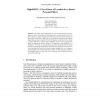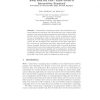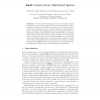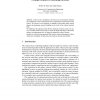HUC
2003
Springer
14 years 4 months ago
2003
Springer
Abstract. One of the main prerequisites for location-based services is knowledge of location. We present a simple algorithm for computing the location of a device based on signal s...
HUC
2003
Springer
14 years 4 months ago
2003
Springer
Location is a primary cue in many context-aware computing systems, and is often represented as a global coordinate, room number, or a set of Euclidean distances to various landmark...
HUC
2003
Springer
14 years 4 months ago
2003
Springer
Ubicomp environments impose tough constraints on networks, including immediate communication, low energy consumption, minimal maintenance and administration. With the AwareCon netw...
HUC
2003
Springer
14 years 4 months ago
2003
Springer
Abstract. Three tools for acquiring data about people, their behavior, and their use of technology in natural settings are described: (1) a context-aware experience sampling tool, ...
HUC
2003
Springer
14 years 4 months ago
2003
Springer
This paper presents the development of a user-oriented framework to support the user reconfiguration of ubiquitous domestic environments. We present a lightweight component model t...
HUC
2003
Springer
2003
Springer
Is Context-Aware Computing Taking Control away from the User? Three Levels of Interactivity Examined
14 years 4 months ago
Abstract. Context-aware computing promises a smooth interaction between humans and technology but few studies have been conducted with regards to how autonomously an application sh...
HUC
2003
Springer
14 years 4 months ago
2003
Springer
Abstract. As low-level architectural support for context-aware computing matures, we are ready to explore more general and powerful means of accessing context data. Information req...
HUC
2003
Springer
14 years 4 months ago
2003
Springer
Context-aware computing in location-aware environments demands the combination of real world position with a computational world model to infer context. We present a novel approach...




